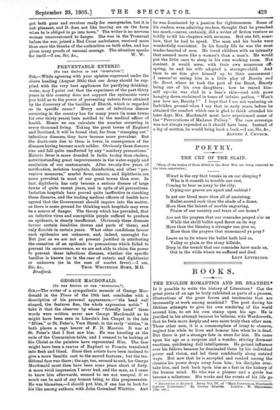PREVENTABLE ENTERIC.
[TO THE EDITOR Or THE "SPECTATOR."] • SIE,—While agreemg with your opinion expressed under the above heading (August 26th) that our Army should be sup- plied with the very best appliances for purifying drinking- water, may I point out that the experience of the past thirty years in this country does not support the optimistic views you hold as to the power of preventing enteric fever attained by the discovery of the bacillus of Eberth, which is regarded as its specific cause ? Every case of infectious disease occurring in the country has for many years (in some towns for over thirty years) been notified to the medical officer of health. Hence we can calculate the number occurring in every thousand living. Taking the great towns of England and Scotland, it will be found that, far from " stamping out" infectious diseases, they have become more prevalent. But the death-rate due to them is lower, in consequence of the diseases having become much milder. Obviously these diseases rise and fall quite unaffected by any "sanitary precautions." Enteric fever is more dreaded in India to-day than cholera, notwithstanding great improvements in the water-supply and sanitation of our cantonments. After twt-nty-five years of notification, isolation hospitals, disinfection, and other " pre- ventive measures," scarlet fever, enteric, and diphtheria are more prevalent in most of our great towns than ever. In fact, diphtheria has only become a serious disease of large towns of quite recent years, and in spite of all precautions. Isolation hospitals have proved quite ineffective in checking these diseases, and the leading medical officers of health have agreed that the Government should inquire into the matter, as there is some ground for thinking such hospitals may even be a source of danger. The theory which has prevailed, that an infective virus and susceptible people sufficed to produce an epidemic, is clearly insufficient. Obviously these diseases favour certain localities (towns and parts of them), and only flourish in certain years. What other conditions favour such epidemics are unknown, and, indeed, unsought for. But just as we are not at present justified in attributing the cessation of an epidemic to precautions which failed to prevent its occurrence, so we are not able to claim the power to prevent these infectious diseases, whether the specific bacillus is known (as in the case of enteric and diphtheria) or unknown (as in the case of scarlet fever).—I am,










































 Previous page
Previous page